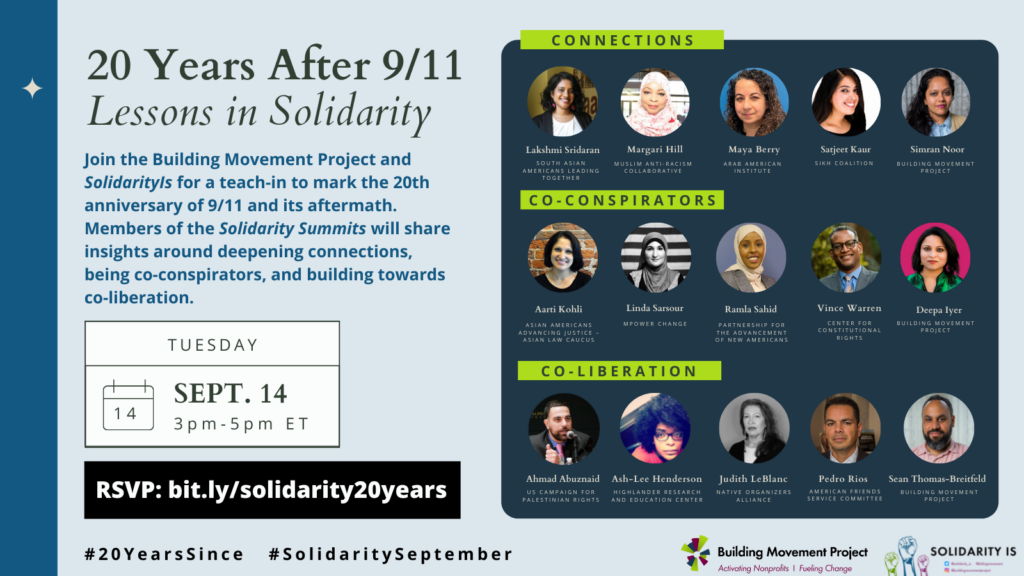Sep
7
2021
September 11th is a day that holds significance for all of us, individually and collectively. Some of us hold lasting memories of that terrible day and its aftermath while others have learned about the ongoing effects of 9/11 throughout their lives. Regardless of our connection with 9/11, each anniversary is an opportunity to reflect, evaluate and re-commit ourselves to our values and communities. On this twentieth anniversary of 9/11, we offer steps that nonprofit organizations can take to recognize the far-reaching impact of 9/11 and its aftermath on communities and policies. Join Building Movement Project and SolidarityIs for a Solidarity Teach-in to explore the ongoing impact of 9/11 on social movements.

Take time to reflect. As we near the anniversary, nonprofits can mark it by creating space and time to remember what happened on 9/11 and how families and communities have been affected. Staff members might have personal connections to 9/11 and are working through grief, loss, and trauma. Staff and members who are of South Asian, Muslim, Sikh or Arab background might have encountered backlash and bigotry over the twenty years since 9/11. Your organization might wish to hold a moment of silence, invite staff into a healing circle, or open up space for conversations with prompts such as: What do you remember about 9/11? ? If you don’t remember the day, what were you taught about the impact of 9/11 and what do you still want to learn? How has that day and its aftermath affected you, your family, your community? On the twentieth anniversary of 9/11, what is important to recognize and commit to?
Connect the Dots. September 11th is not a historical moment that is frozen in time. The consequences of policy decisions made after 9/11 pervade our lives to this day. We recommend creating space with staff and members to learn about and discuss the ongoing ways in which public policies and narratives affect us today. For example, the current surveillance state is the result of laws passed before and after 9/11 which enabled law enforcement entities to collect and share information regardless of individualized suspicion. The overwhelming allocation of resources to the military in the wake of 9/11 is partly why public health infrastructure is crumbling in the midst of a global pandemic. The alarming situation in Afghanistan since American troops withdrew exposes the failure of the US to rebuild the region’s systems and institutions over the past two decades. The high levels of hate violence being reported by the FBI for 2020 are part of the trajectory of bigotry, Islamophobia and xenophobia that was fomented after 9/11 which targeted South Asian, Muslim, Sikh, and Arab communities.
Connecting these dots includes making time to learn more about the ongoing effects of 9/11 by discussing readings and attending events. We recommend the Brennan Center for Justice’s series, 9/11 at 20 for policy perspectives, fiction and nonfiction books for different age groups curated by Publisher’s Weekly, educational resources from Families of September 11, the University of Pennsylvania’s Teaching Beyond September 11th project and the Costs of War Project, and community histories including Deepa Kumar’s Islamophobia and the Politics of Empire and BMP’s own Deepa Iyer’s We Too Sing America: South Asian, Arab, Muslim, and Sikh Immigrants Shape Our Multiracial Future.
Partner with and Support Organizations Affected by 9/11. In the aftermath of 9/11, Arab, Middle Eastern, Muslim, Sikh and South Asian (AMEMSA) communities experienced backlash in the form of hate violence, workplace discrimination and government profiling and surveillance. Nonprofits working with these communities continue to highlight ongoing effects of the post 9/11 backlash and the War on Terror, from mental health to family separations. In addition, AMEMSA organizations are addressing issues related to the pandemic, immigration policy, and access to basic benefits. And, AMEMSA organizations have contributed to movements for justice through organizing, mobilization, narrative change, and advocacy. Assess whether your organization supports and partners with AMEMSA groups. How could you include AMEMSA groups in your coalitions and networks? What connections can be made between the issues that your organization address and those affecting AMEMSA communities? How can your organization uplift the work of AMEMSA groups to your networks of funders and partners?
Release and Share a Solidarity Statement. If your organization is closely connected to communities affected by 9/11 and its aftermath, you could consider making a statement of support and solidarity. The statement could be an opportunity to center affected communities and demonstrate your commitment to being a strong partner. Your statement could also include calls to action for your members and links to resources. Here’s an example of a solidarity statement related to the 9/11 anniversary from the National Asian American Leaders Table.
Later in September, BMP will be sharing a list of resources related to the 9/11 anniversary including a podcast episode of Solidarity Is This with a focus on movement building over the past twenty years. We hope to see you on September 14th at our solidarity teach-in.

